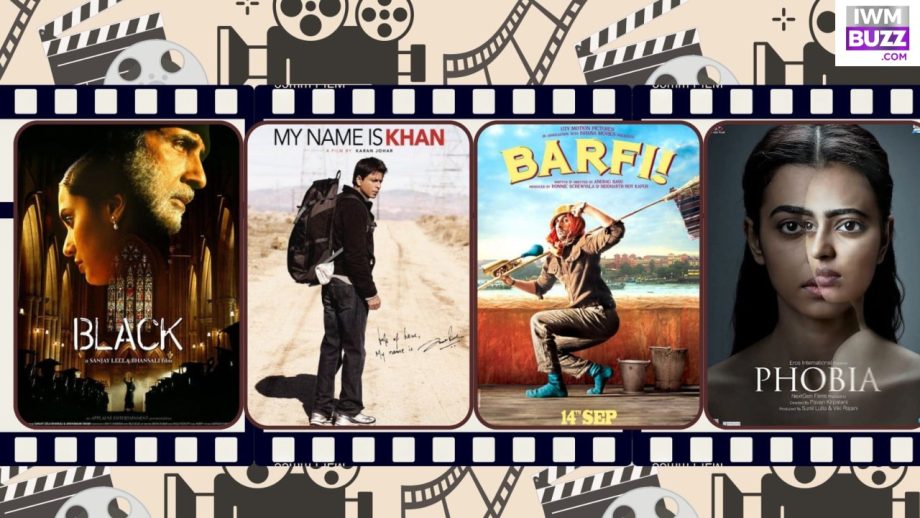The world of cinema has long been recognized as a powerful medium for conveying complex narratives and emotions, and in recent years, Bollywood has been at the forefront of using its storytelling prowess to illuminate the often-overlooked realms of rare diseases and mental health issues. These films not only entertain but also play a crucial role in raising disease awareness, challenging societal stigmas, and fostering empathy and understanding among audiences.
In this exploration, we delve into ten Bollywood films that have artfully tackled rare diseases and mental health issues, shedding light on these often misunderstood conditions and offering a nuanced perspective that transcends the boundaries of mere entertainment. These cinematic endeavours serve as a testament to the transformative potential of storytelling in promoting awareness and inclusivity.
“Taare Zameen Par” (2007), directed by Aamir Khan, is a poignant portrayal of dyslexia, a learning disorder. The film follows the journey of a dyslexic child and his struggles with the conventional education system. It serves as a heartfelt plea for recognizing and nurturing the unique talents of individuals with learning disabilities, sparking a conversation on inclusive education.
In “My Name is Khan” (2010), Shah Rukh Khan takes on the role of Rizwan Khan, a character with Asperger’s syndrome. The film explores his quest to meet the President of the United States and deliver a message of peace. Beyond the central theme of Asperger’s, it delves into themes of discrimination and acceptance, touching on relevant social issues.
In “Paa” (2009), Amitabh Bachchan plays Auro, a child with Progeria, a rare genetic disorder that causes rapid ageing. The film portrays Auro’s life and relationships, highlighting the emotional challenges faced by him and his family. It educates viewers about Progeria while underscoring the importance of love and resilience.
“Dear Zindagi” (2016), directed by Gauri Shinde, revolves around a young woman, Kaira, played by Alia Bhatt, who grapples with anxiety and depression. The film destigmatizes mental health issues and showcases the therapeutic journey of the protagonist, emphasizing the importance of seeking help and self-discovery.
“Hichki” (2018) features Rani Mukerji as Naina Mathur, who has Tourette syndrome, a neurological disorder characterized by tics. The film explores Naina’s determination to become a teacher despite societal prejudices. It sensitively portrays Tourette syndrome and offers a message of resilience and acceptance.
Directed by Sanjay Leela Bhansali, “Black” (2005) tells the story of Michelle McNally, played by Rani Mukerji, who is deaf and blind. The film beautifully portrays her relationship with her teacher and the transformative power of education. “Black” is a moving depiction of overcoming sensory impairments.
“Barfi!” (2012), while primarily focusing on the life of Barfi, a character who is deaf and mute, also touches upon the theme of autism through the character Jhilmil, played by Priyanka Chopra. Jhilmil is portrayed as a girl with autism, and the film sensitively portrays her unique behaviour and communication style. “Barfi!” is known for its compassionate approach to disability and celebrates the power of love and friendship in overcoming challenges.
“Koi… Mil Gaya” (2003) This sci-fi drama explores the story of Rohit, a developmentally delayed young man who befriends an extraterrestrial being. While the film leans heavily into the science fiction genre, it also offers glimpses into the challenges faced by individuals with intellectual disabilities and the importance of friendship and inclusion.
“Phobia” (2016) is a psychological thriller that delves into the world of agoraphobia, a mental disorder characterized by an intense fear of public places. Radhika Apte plays the lead role, and the film takes viewers on a suspenseful journey through the mind of the protagonist, highlighting the debilitating impact of the condition.
These Bollywood films stand as remarkable examples of cinema’s power to raise awareness, foster empathy, and challenge societal norms regarding rare diseases and mental disorders. They provide a platform for discussion, encouraging society to embrace diversity and inclusivity.

